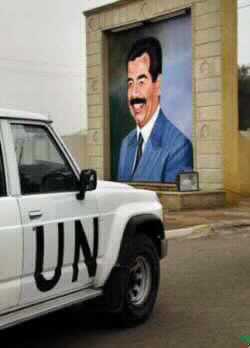- Author:
& News Agencies - Section:
WORLD HEADLINES
UN Teams Have Chance to Refute U.S. Charges -Saddam

President Saddam Hussein said on Thursday he was ready to give U.N. weapons inspectors a chance to disprove American allegations that Iraq possesses weapons of mass destruction. His first comment on the inspections since they resumed last week coincided with a burst of defiance from other Iraqi officials, and pressure on the inspectors from Washington to find the weapons of mass destruction that it is sure Iraq has.
No inspections were taking place on Thursday or Friday because of the Muslim Eid al-Fitr holiday, but all eyes were on Sunday's deadline for Iraq to come clean about any biological, chemical or nuclear arms programmes it has.
Iraq insists that, since it has no such programmes, it will merely be listing "dual use technology" that has peaceful as well as military applications.
"...some might claim we didn't give them (the inspectors) the proper chance to disprove the American allegations that Iraq produced weapons of mass destruction during the period of the inspectors' absence," Saddam said in remarks broadcast on Iraqi television.
"For that reason we shall provide them with such a chance, after which, if the weaklings remain weak and the cowardly remain cowards, then we shall take the stand that befits our people, principles and mission," he told the Iraqi leadership as he congratulated them on Eid al-Fitr.
The inspectors have reported nothing but cooperation from Iraq in their visits to 20 suspect sites since November 27. So far, they have found nothing untoward.
"INSPECTIONS A HOAX"
However, in an address in Baghdad on Wednesday, Iraqi Vice President Taha Yassin Ramadan accused the inspectors of spying for the United States and Israel and helping Washington prepare for war on Baghdad.
Britain's BBC radio quoted him as saying after his address that independent monitors should observe the inspectors' work.
And Deputy Prime Minister Tareq Aziz told ABC's "Nightline" in the United States on Wednesday: "Washington wants the war...The whole issue of weapons of mass destruction is a hoax. When they find that there are no weapons of mass destruction, they would use another pretext to attack."
President Bush again insisted this week that Iraq does possess weapons of mass destruction, and has said it will not be acceptable for Iraq to deny their existence in its dossier to be delivered by Sunday.
White House spokesman Ari Fleischer said on Wednesday that inspections would accelerate after the declaration is received, but he reiterated U.S. concerns that the U.N. inspections lacked the necessary muscle.
"Whether inspectors ultimately will be able to disprove any lie by the Iraqis remains to be determined," he said.
Hussam Mohammed Amin, head of the Iraqi National Monitoring Directorate, said Baghdad's arms dossier for the United Nations would be huge but would repeat "that in Iraq there are no weapons of mass destruction."
Amin said that new activity since the previous U.N. weapons inspectors left in 1998 consisted of "dual-use activities" -- a stance not likely to satisfy Washington, whose military build-up in the Gulf region continues.
However, Deputy Defense Secretary Paul Wolfowitz, a leading Bush administration hawk on Iraq, on Wednesday dismissed any suggestion that the declaration might in itself trigger a U.S. decision on military action.
THOUSANDS OF PAGES
The declaration is likely to be thousands of pages long and may take 10 days to analyze, U.N. diplomats say.
"I'm quite sure (Bush) is not going to make it simply on the basis of one single piece of information," Wolfowitz said in Brussels. "He's going to make it...also (in) close consultation, particularly with our allies but indeed with the international community."
One diplomat at the Security Council said the significance of the file was that it set a baseline for judging violations.
"After the declaration has come in, anything that is found shows that Saddam Hussein meant to deceive," he said.
In the latest indication of U.S. preparations for war, the New York Times said the Pentagon planned to mobilise thousands of National Guard and Reserve troops shortly to fill military jobs in the event of a conflict.
The aircraft carrier Harry S. Truman and its battle group were due to depart on Thursday with warplanes and missiles that could be part of an opening salvo in any U.S.-led attack.
And in Tokyo, Japanese Prime Minister Junichiro Koizumi defended a decision to send a destroyer with a state-of-the-art missile detection system to the Indian Ocean, a move many see as tacit backing for a possible U.S. attack on Iraq.
In his speech, Saddam blasted countries who had not stood up to the U.S. campaign against him, saying that Iraq had "put up a defense on behalf of every honest, patriotic person in the face of the unjust, arrogant, debased American tyranny."
He urged his aides to show patience, explaining that this did not mean retreat but could be "a regrouping, a mobilization of forces to make them act in a new framework and with superiority at a later stage."
PHOTO CAPTION
U.N. Arms inspectors arrive to search the al-Tuweitha plant run by Iraq's nuclear power authority in Salman Bak, 12 miles south of the capital December 4, 2002. President Saddam Hussein said on Dec. 5 he was ready to give U.N. weapons inspectors a chance to disprove American allegations that Iraq possesses weapons of mass destruction. (Suhaib Salem/Reuters)


 Home
Home Discover Islam
Discover Islam Quran Recitations
Quran Recitations Lectures
Lectures
 Fatwa
Fatwa Articles
Articles Fiqh
Fiqh E-Books
E-Books Boys & Girls
Boys & Girls  Women
Women









